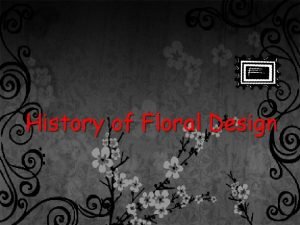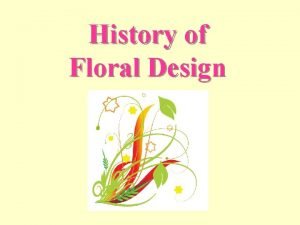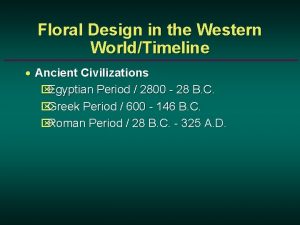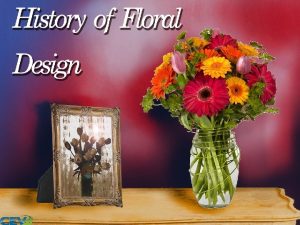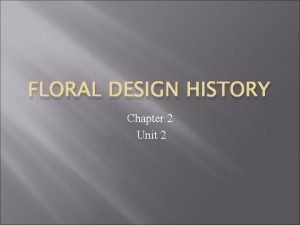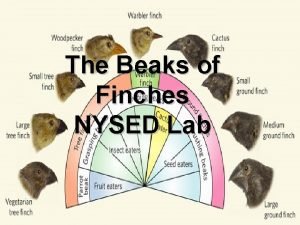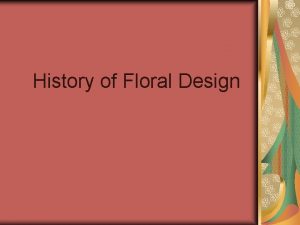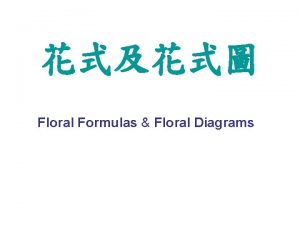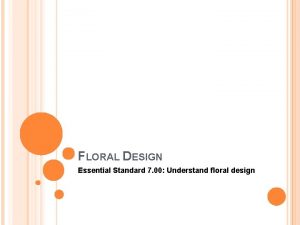History of Floral Design Occidental Style Evolved from













- Slides: 13

History of Floral Design

Occidental Style | Evolved from the Egyptian & Middle Eastern cultures | Further developed by the Europeans | Characterized by large, massive designs

Oriental Style | Started | Used in China by the Japanese | Characterized flowers used as a line design with few

Egyptian Period 2800 – 28 B. C. | Flowers are arranged in rows in shallow containers, used bright colors | Arrangements of neatly piled fruits & vegetables would be placed on feast tables | Water lilies & lotus blossoms were placed in elaborate vases, bowls, & jars

Ancient Greeks 600 – 146 B. C. | Flowers were scattered on tables & streets during banquets & festivals | Used garlands & wreaths, these were worn at special events & presented as awards | Cornucopia, horn-of-plenty, was introduced. It was displayed standing up, rather than on its side.

Romans 28 B. C. – 325 A. D. | Elaborate | Scattered banquets | Altar use of plant material roses on tables and floors at gifts of blossom filled scarves were part of religious ceremonies

Byzantine Period 320 – 600 A. D. | Arrangements | Formal of cut flowers conical designs with clusters of blossoms at regular intervals

Renaissance 1400 – 1600 A. D. | Large, tall, pyramidal & symmetrically balanced designs | Documented | Loose, | Used by the artists of the time uncrowded & airy designs intense colors to contrast white walls | Arrangements container were twice the height of the

Baroque Period 1600 – 1775 A. D. | Began as symmetrical oval shaped designs | Arrangements accessories | The incorporated a variety of S-curve & crescent arrangements were developed

Flemish Style 1600 – 1750 A. D. | Beautifully captured by Dutch painters | Better proportioned & more compact than the Baroque style | Massed, oval shaped designs with rich colors & an array of flowers

Georgian Period 1714 – 1760 A. D. | Used a single flower type | Symmetrical, triangular shape | Nosegay: a hand-held bouquet that became stylish. These were placed in bowls & became the 1 st centerpiece as we know them today | Greatly influenced the decorative acts in Colonial America, fan-shaped & triangular arrangements

Victorian Period 1820 – 1914 A. D. | Large numbers of flowers were crammed into a compact container | Asymmetrical designs with no focal point | Unplanned designs with many different colors & flower types | Attempted to establish rules of floral design

Line - Mass Designs | Combination of design | Present of occidental & oriental styles style of design in the U. S. today
 History of floral design
History of floral design Floral design pricing worksheet
Floral design pricing worksheet Greek period floral design
Greek period floral design Middle age floral design
Middle age floral design Middle ages floral design
Middle ages floral design Objectives of flowers
Objectives of flowers Free form expression floral design
Free form expression floral design History of wearing floral designs as personal adornment
History of wearing floral designs as personal adornment Shin floral design definition
Shin floral design definition Early american floral design
Early american floral design Galapagos finches evolved partly due to
Galapagos finches evolved partly due to The different tools used during the beaks
The different tools used during the beaks Galapagos finches evolved partly due to
Galapagos finches evolved partly due to Hypocotyl necrosis in french bean is due to
Hypocotyl necrosis in french bean is due to
